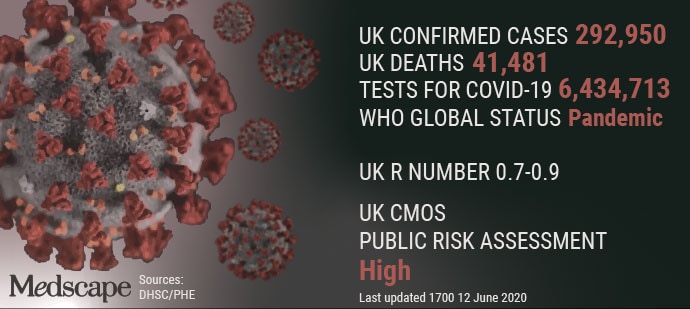These are the UK coronavirus stories you need to know about today.
PM's COVID-19 Condition Check
Chancellor Rishi Sunak led today's Downing Street briefing and gave the latest on Boris Johnson's health. "The Prime Minister remains in intensive care where his condition is improving. I can also tell you that he has been sitting up in bed and engaging positively with the clinical team," he said.
Prof Stephen Powis, national medical director of NHS England, said the PM was getting "exceptional, world class care" at St Thomas'.
Boris Johnson and COVID-19: A Timeline
Doctor and Two Nurses Remembered
Tributes have been paid to more NHS workers who’ve died after testing positive for COVID-19.
Dr Anton Sebastianpillai was in his 70s. He died on Saturday at Kingston Hospital, south-west London. "It is with great sadness that I confirm the death of a consultant geriatrician who was part of the team at Kingston Hospital," a spokesperson said.
The acting Liberal Democrat co-leader, Sir Ed Davey tweeted: "I was privileged to meet him & discuss the NHS & Tamil history.
"Anton is hugely respected as a consultant & author: his Illustrated History of Sri Lanka is world class."
Alice Kit Tak Ong was still working as a practice nurse at the age of 70.
GP Dr Amrit Lamba at the Colindale medical centre in Barnet told the Guardian: "She had talked of retirement, but nursing and medicine was a real passion for her and she would never let it go.
"Even at the end of her career, she was up-to-date on every development and sharing her wisdom with the practice. She’ll be missed and remembered very, very fondly."
Rebecca Mack was a 29 year old cancer nurse at the Royal Victoria Infirmary in Newcastle.
One colleague, Jamie Young, paid tribute: "Today, the NHS lost an absolutely amazing and beautiful nurse, myself and my colleagues lost the most tremendous clinician. At the age of just 29, she had her entire life ahead of her."
In Memoriam: Healthcare Workers Who Have Died of COVID-19.
Deaths
Another 938 UK COVID-19 hospital deaths were announced today, the biggest rise yet, taking the total to 7097.
Scotland followed England and Wales in issuing data on all COVID-19 deaths rather than just the daily hospital COVID-19 death figures. National Records of Scotland said that as of 5th April, 354 deaths were registered in Scotland where COVID-19 was mentioned in the death certificate. Previously 220 hospital deaths were announced during the same period.
Over 60% of all Scottish COVID-19 deaths were patients aged 75 or over.
Of the 828 deaths reported today in English hospitals, patients were aged between 22 and 103 and 46 of the patients (aged between 35 and 96 years old) had no known underlying health condition.
Today the World Health Organisation (WHO) listed the UK among European countries with higher than expected COVID-19 mortality. "Europe remains very much at the centre of the pandemic," Dr Hans Kluge, WHO regional director for Europe said.
He continued: "Seven of the top 10 countries that are most affected across the globe are located in the European Region: Following USA, we have Spain, Italy, Germany, France, and then after China, and Iran, the United Kingdom, Turkey and Switzerland."
Dr Kluge added: "While adults over the age of 60 are at higher risk from complications, the recent death of a 5-year-old in the UK and of a 12-year-old in Belgium tell us that in rare cases, the disease can also be fatal for children and younger adults."
Predictions
The Institute for Health Metrics and Evaluation (IHME) in Seattle predicts 66,000 UK deaths from COVID-19 by August, with a peak of nearly 3000 deaths a day - the worst in Europe - the Guardian reported. The forecasts are based on the trajectory of deaths rather than case numbers, and the speed with which lockdown measures were put in place.
Experts via the Science Media Centre are treating the predictions with scepticism:
Prof Sir David Spiegelhalter, chair, Winton Centre for Risk and Evidence Communication, University of Cambridge, said: "I am very sceptical of these IHME projections, which are based on assuming a rather simple mathematical model for the whole course of the epidemic. I suspect they will change a lot as new data arrives - we shall see."
Prof Sylvia Richardson, University of Cambridge & president elect of the Royal Statistical Society & co-chair of the Royal Statistical Society Task Force on COVID-19, said: "These projections seem both extreme and too precise, especially allowing for the limitations in the daily reports. Time will tell, but I feel these current claims should be treated with considerable scepticism."
Lockdown Renewal
While UK Government ministers and advisers wouldn't be drawn on extending the lockdown after the initial 3 weeks, Wales has already confirmed its lockdown will stay in place.
First minister Mark Drakeford said gains shouldn't be thrown away "by abandoning our efforts just as they begin to bear fruit".
Chancellor Rishi Sunak said: "We committed that there would be a review in around 3 weeks. That review will be based on the evidence and the data provided by SAGE [Scientific Advisory Group for Emergencies] which will only be available next week."
Deputy Chief Scientific Adviser Dame Angela McLean gave more evidence of lockdown measures having an impact: "This count of new cases in the UK, day-by-day, over the last few weeks is not accelerating out of control."
And she said a wide range of data will be assessed: "My colleagues who are generating that advice will be using hard data on things like numbers of people arriving at hospital, numbers of people having to be admitted to critical care in hospital, but also things like that data on how many people are there in [railway] stations, survey data asking people precisely what behaviours, have you toned down in the last few weeks?"
She continued: "That is the strength of that approach is it lets you take a lot of different kinds of information and do the best job you can of synthesising them together in order to understand the situation we have been in, in the past that has brought us to where we are now, and then do what you can to project into the future what's going to happen next."
More News in Brief
Scotland's Health Secretary Jeane Freeman was due to talk to the BMA and Royal College of Nursing today over continuing PPE concerns. Today she told Scotland's daily news briefing: "We are absolutely clear that as issues arise, I want to be able to know about them so I can act on them. We have sufficient supplies of PPE. Now we have a number of orders already placed coming in weekly. We continue to work to increase that supply chain and make sure that we are confident that our supply can meet the demand that is there."
The NHS launched a mental health hotline to help support health workers dealing with COVID-19. More than 1500 volunteers from charities including Hospice UK, the Samaritans, and Shout will staff the lines to give psychological support to NHS staff in need.
The European Research Council (ERC) issued a statement on the departure of its President Professor Mauro Ferrari. He said he quit because he was "extremely disappointed" by Europe's response to COVID-19. However, the ERC issued a statement saying: "We regret Professor Ferrari's statement, which at best is economical with the truth. This Scientific Council remains dedicated to pursuing the mission for which the ERC was established: the support of bottom-up ground-breaking research."
See more global coronavirus updates in Medscape’s Coronavirus Resource Centre.




